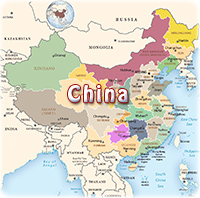
Physical Map of India
The Indian territory projects into the Indian Ocean. It stretches from the Himalayas in the north to the coastal villages of the south and the humid tropical forests on the south-west coast, from the fertile Brahmaputra valley in its east to the Thar Desert in the west. Its northern frontiers are defined largely by the Himalayan mountain range.
Victoria Memorial, a large marble building in Kolkata (formerly Calcutta), erected between 1906 and 1921.
In 1690 the British East India Company founded Calcutta as a trading post on the marshy east bank of the Hugli River. Chosen for its easily defensible location and its access to the Bay of Bengal, the site developed into an important trading port. In 1773 Calcutta was made the capital of British India. As merchants and workers from all over the Indian subcontinent flocked to the city, British interests prospered, and British colonizers built mansions and palaces on land reclaimed from the marshes and swampland. In 1912, however, Calcutta lost its position as the colonial capital to Delhi. The end of British rule in India in 1947 cut off many of Calcutta's sources of trade and brought a deluge of immigrants to the city.


|
Copyright © Geographic Guide - Travel Asian Continent. |
